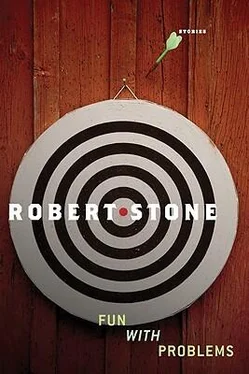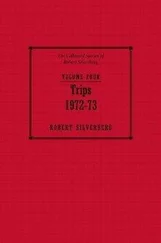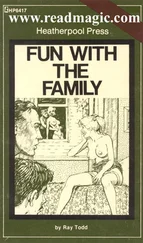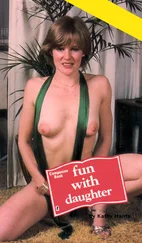We sneaked out in a crouch like two stealthy movie Indians, under cover of a darkness dimly lighted by a day-for-night sequence. The two stars onscreen told each other their sad backstories by a campfire. Their characters had the leisure to chat because Apaches never attacked at night.
Across the street, appropriately, a country-and-western hat band from Kyoto was crooning rural melodies. The two of us jaywalked across Hollywood and into the lobby of the faded hotel where the band was performing. A man in a stained tuxedo — an unwelcoming figure — directed us to a table against one wall. I ordered a Pacifico; Lucy had Pellegrino and a Valium.
"It's Canada," Lucy told me.
"What is?"
"The scenery. In the thing over there."
"The thing? You don't remember what the picture's called?"
"I like repressed it," she said, and gritted her teeth. "Sure I know what it's called. It had different titles postproduction."
"Such as?"
" Unbound. Unleashed. Uncooked. "
We introduced ourselves and claimed we had heard of each other. For a while we watched the hat act sing and swing. The lads looked formidable under their tilted sombreros. Their lead singer sang lyrics phonetically, rendering interpretations of "I Can't Stop Loving You," "Walking the Floor Over You" and other favorites. Their audience was scant and boozy. There were a few other bold escapees from the premiere across the street.
"You were a great Apache."
She only shook her head. Plainly, even qualified professional regard would take us nowhere. For some reason I persisted.
"Come on, I was moved. You dying. Featured role."
"Dying is easy," she said. "Ever hear that one?"
I had. It was an old actor's joke about the supposed last words of Boris Thomashevsky, an immortal of the Yiddish stage. Surrounded by weeping admirers seeking to comfort him, he gave them a farewell message. "Dying is easy," said the old man. "Comedy is hard."
"They shot different endings," Lucy explained. "One sad, one happy."
"Really?" It was hard to believe they would perpetrate a sad ending with the two beloveds, which would only have made a fatuous movie even worse. When riding a turkey, I believe, cleave to the saddle horn of tradition. But sad endings were a new thing in those years — the era of the worst movies ever made. Industry supremos who hadn't been on the street unaccompanied for forty years were still trying to locate the next generation of dimwits. So they tried sad endings and dirty words and nude body doubles. There was no more production code; movies were supposed to get serious and adult. Sad endings were as close as most of them could reach.
"So I hear. I wasn't there. I didn't read the endings. Like I had other things on my mind. I didn't see it, did I? We're over here."
"Okay."
"I bet they went with the happy, though." She sneaked a quick look around and bit a half of her second ten-milligram Valium. I told her the happy seemed likely.
"Oh," she said, and she smiled for the first time in our acquaintance. "Tom Loving. You're a writer." She either guessed or had somehow heard of me. Her smile was appropriately sympathetic.
She told me they had reshot a lot during the filming, different versions of different scenes.
"I die in all of them," she said.
Eventually we drove our separate cars to an anchored trailer she was living in on the beach in Malibu. As I remember, she was tooling around in a big Jaguar XJ6. We sat under her wind-tattered awning on the trailer's oceanfront deck and a west wind peeled wisps of cold briny fog off the water. It was refreshing after the sickly perfume of the theater and the haze of booze and smoke in the lounge.
"I'm not happy," Lucy told me. "I'm sure you could tell, right?"
"I saw you were crying. I thought it was over the movie."
"If we'd stayed," she said, "you would have cried too."
"Was it that bad?"
"Yes," she said. "Yes! It was deeply bad. And on top of it that bastard Pritchard whom I've always loved." She looked at me thoughtfully for a moment. "You know?"
"I do," I said. "We've all been there."
She looked away and laughed bitterly, as though her lofty grief must be beyond the limits of my imagination. I was annoyed, since I had hoped to divert her from pining. On the other hand, it was entertaining to watch her doing unrequited love with restraint and a touch of self-scorning irony.
"This man is deliberately trying to make me crazy," she said. "And to kill himself."
"It's a type," I explained.
"Oh yeah?" She gave me another pitying glance. "You think so?"
She had crushed my helpful routine. I put it aside. "Was that the wife?" I asked. "The blonde?"
"Yes," Lucy said. "Think she's attractive?"
"Well," I said, "on a scale of yes or no…"
"All right, all right," she said. "All right."
"Met her?"
"I have met her," said Lucy. "When I did, I thought, Hey, she's not a bad kid. But she's a fucking bitch, it turns out."
I kept my advice to myself, and little by little Lucy detached herself from her regrets. Later I came to know how suddenly her moods could change. It was of course an affliction, in her case untreatable. She kept her ghosts close at hand and always on call. They were present as a glimmer of surprise behind her eyes that never disappeared.
After a while I got her to walk with me; we shed our shoes and went across the moonlit beach. Brion seemed to be off her mind.
The sand at the water's edge had a steep dropoff to the surf. We clambered down to the wet sand where the waves broke. The sea's withdrawing force was nearly enough to pull us off our feet. Lucy lost her balance and I had to put an arm around her waist to preserve her.
"It could take you away," Lucy said.
We climbed the four feet or so to the looser sand, which left us out of breath. As we walked back, Lucy told a story from her earliest days in town. She had fallen in with some fast-lane hipsters. Many of them came from industry families. One night she and a friend found themselves on the beach with the daughter of a world-famous entertainment figure. The daughter passed out, so when Lucy and her friend saw somebody coming they ran off into the nearby shadows. Two men arrived, equally world-famous. They encountered the daughter sprawled on the sand and tried to rouse her. The adolescent responded with dazed, rude mutterings. One man told the other whose daughter she was. Lucy always remembered his Viennese accent.
" Ja ," the man said to his friend. "Kid's a valking disaster."
Lucy and her friend giggled in the dark. Who could walk?
"I don't drink anymore," Lucy told me.
In spite of her solemn reflections, when we got back to the trailer she produced some Quaaludes and cocaine for me. I did a sopor and a couple of lines on her beautiful goatskin table. We drank champagne with it, which I feared would be a mistake. We were ready to get it on, both of us, but I wondered briefly if she might not suffer a morning-after-the-fact change of heart. She was a woman on the rebound; I was a stranger and afraid there might be recriminations. That was not Lucy, but I didn't know it then. She seemed so mercurial. I think we watched a little of Carson that night and found it uproariously funny in the wrong places. It was true that she smoked incessantly and smelled of tobacco. Otherwise she was a Levantine angel, one of the celestial damsels awarded to the devout and to me. In the sack she told me about her early life in Fresno.
"Know what people called Armenians?" she asked.
"What, baby?" We had gone to bed to Otis Redding, "Dock of the Bay," and there beside me Lucy addressed her après cigarette with such intensity and style that, after three years clean, I wanted one too. "Tell what they called the poor Armenians."
Читать дальше












